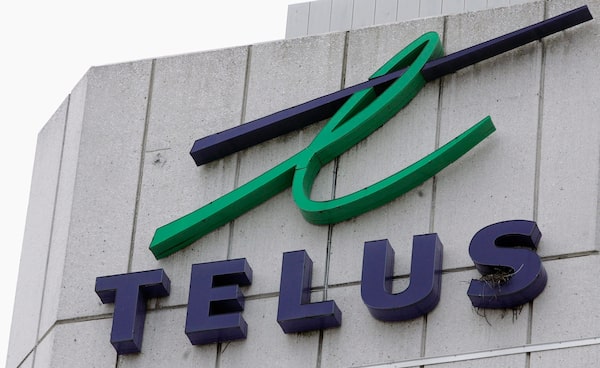
Telus has technical controls to prevent anyone from using the data to identify individuals.Chuck Stoody/The Canadian Press
Telus Corp. says it will provide access to anonymized wireless data to a federal agency in a bid to help researchers detect patterns and co-ordinate health care efforts in response to COVID-19.
The partnership between the telecom company and the Natural Sciences and Engineering Research Council of Canada will allow researchers to glean insights into the movements of Canadians that could prove useful in reducing the spread of the coronavirus.
Researchers could, for example, explore whether people are more likely to stay home when asked to do so by a politician, or whether people who own cottages are going to them on weekends, said Pam Snively, chief data and trust officer at Telus. The data, which are generated when a cellphone pings a nearby tower, are stripped of any personal information and aggregated so that individuals cannot be identified, Ms. Snively said.
“It will give us an idea of what measures are effective and what measures are not effective," Ms. Snively said. “We see this is as a social obligation … to help our governments make more informed, data-driven decisions during this crisis.”
BCE Inc. and Rogers Communications Inc. said they’d be open to discussing how their wireless data could be used in government efforts to combat COVID-19, so long as the privacy of their customers is not compromised. “Any approach would have to respect privacy laws,” BCE spokesman Marc Choma said in an e-mail.
The Public Interest Advocacy Centre (PIAC), a consumer advocacy group, has raised concerns about telecom providers using location data for public health initiatives.
Earlier this month, PIAC filed an application requesting that the Canadian Radio-television and Telecommunications Commission (CRTC) assume oversight of the industry’s involvement in such efforts, which the regulator dismissed. Among the advocacy group’s requests was that the CRTC prohibit telecom providers from using any of their existing databases to track COVID-19 without getting fresh consent from their customers.
In addition to privacy concerns – such as the possibility that hackers or insiders could gain access to the data – PIAC executive director John Lawford said some customers simply may not want to contribute to such initiatives.
“You could combine a supposedly aggregated, or de-identified, database with other data sets and reidentify people; there’s always that risk," Mr. Lawford said.
Ms. Snively said Telus has technical controls to prevent anyone from using the data to identify individuals.
“We spent a lot of time on this," Ms. Snively said. “Not only did we work with a couple of the leading de-identification experts in the world, but we also did a tremendous amount of stress testing."
The company will also supervise any researchers who are granted access, she added. “No data ever leaves our platform.”
Your time is valuable. Have the Top Business Headlines newsletter conveniently delivered to your inbox in the morning or evening. Sign up today.
 Alexandra Posadzki
Alexandra Posadzki